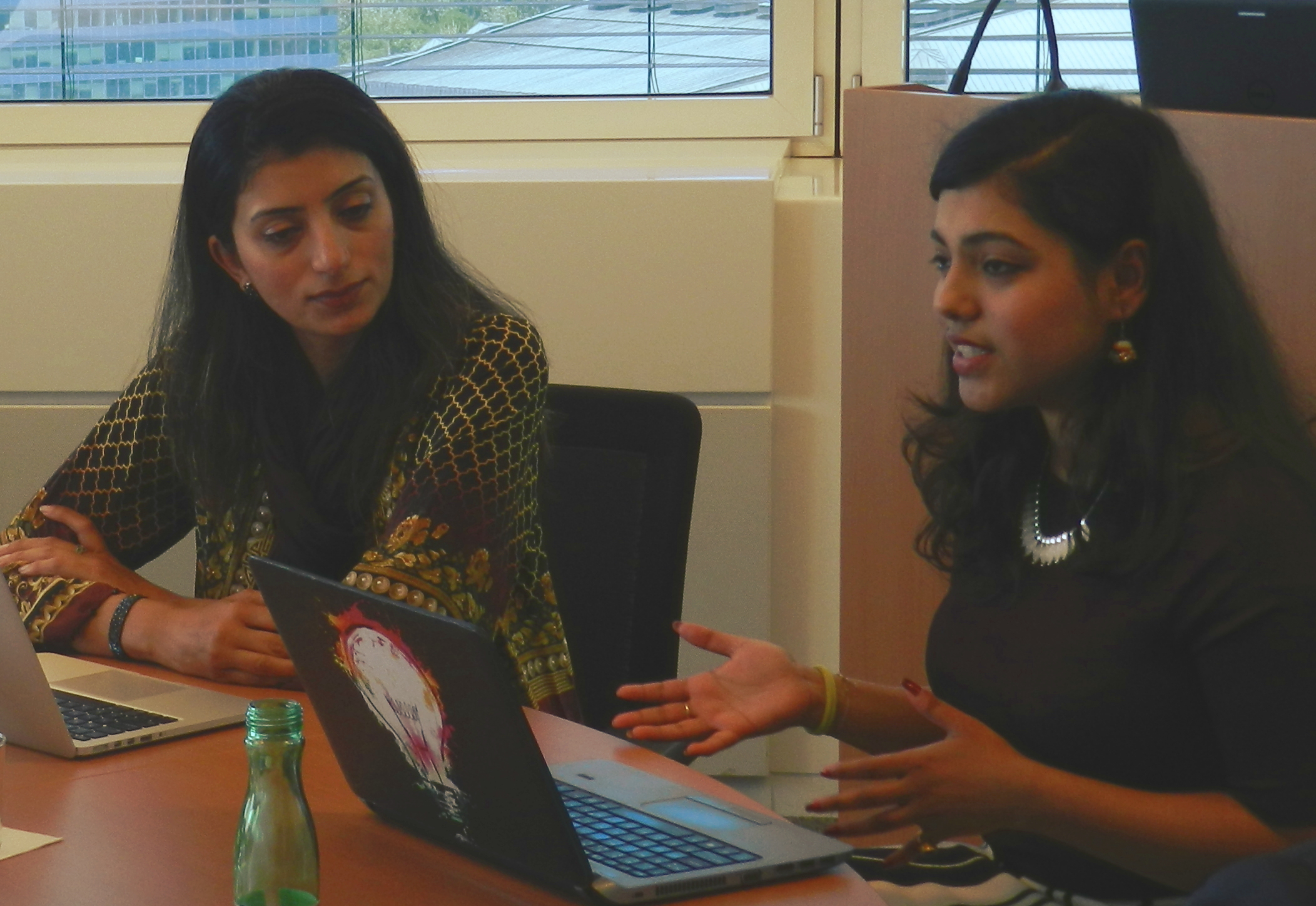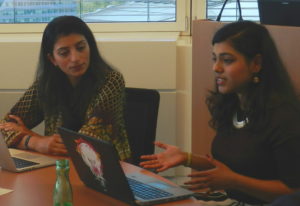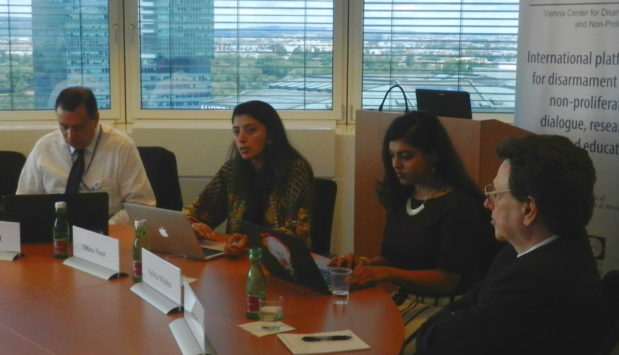
On 30 June 2017, the VCDNP hosted a seminar by Sitara Noor, former VCDNP Research Fellow, and Sylvia Mishra, Researcher at Observer Research Foundation, New Delhi, and former Visiting Fellow at the James Martin Center for Nonproliferation Studies (CNS) at the Middlebury Institute for International Studies at Monterey, entitled "Nuclear Security Norms and Practices in Pakistan and India.” The seminar was moderated by CNS Director Dr. William Potter, with commentary by Tariq Rauf.

The seminar addressed the need to find a way to maintain the security of nuclear materials which, given the large stockpiles of fissile material in South Asia, could not be more pronounced. The dangers associated with nuclear materials falling into the hands of terrorists or being sold on the illicit market, along with the region’s existing vulnerabilities to terrorist attacks, give cause for concern. During the seminar, the speakers focused on the existing nuclear security structures in both Pakistan and India, and suggested avenues for cooperation in confidence building measures to enhance nuclear security in the future.
Ms. Noor presented an overview of Pakistan’s security architecture and the country’s threat perceptions. As Pakistan’s nuclear program and military infrastructure have significantly expanded, so too have the perceived risks. Ms. Noor highlighted that Pakistan has taken important steps to reduce the risk of terrorism, and noted that there has been a remarkable decline in terrorist attacks since 2015, though the threat perception of a potential nuclear terrorist attack occurring in Pakistan has remained high. Since the 1960s, Pakistan has been working on establishing the necessary national authorities to maintain and secure its nuclear stockpiles. Since 2001, Pakistan has an independent regulatory body that is charged with overseeing the safety and security aspects of all nuclear materials. Military nuclear capabilities are under the auspices of the National Command Authority in which they have devised a comprehensive plan focusing on prevention, detection, response and accountancy of nuclear materials. This plan has evolved over the years to adapt to changing threat perceptions, such as the risk of state failure, nuclear weapons or material falling into the wrong hands and loss of control or unauthorized use of nuclear weapons. Here Ms. Noor gave the prime example of information sharing and praised Pakistan’s transparency measures with regard to its civilian nuclear sector, but noted that the limited information shared on its weapons program leads to misinterpretations and over dramatization of Pakistan’s nuclear capabilities. She stressed that a balance needs to be found in order to avoid miscalculated and ill-informed reactions from neighbouring States or non-State actors.
Ms. Mishra gave an overview of India’s nuclear security structure and perceived threats. She highlighted that India’s main concern is with terrorism, not only from outside networks but also within its own borders. She further noted that in India the threat of nuclear terrorism is not limited to the use of nuclear weapons but also involves the threat of a radiological dispersal device or aerial attack on a nuclear facility. Due to the growing threat of a potential air‑assault, India’s reactors now have a double containment that can withstand the impact of an aircraft crash. In discussing India’s legal framework for maintaining the security of its stockpiles, Ms. Mishra highlighted the Atomic Energy Act (1962) which governs India’s legislative and regulatory framework. She noted that the framework is under the oversight of the regulatory board. Also, she pointed to India’s bid to join the Nuclear Suppliers Group (NSG), noting that India has harmonized its export control lists and rules to be consistent with NSG guidelines. In addition, she underscored that India had invited organizations to conduct peer reviews (however only in the context of safety) at two units in Rajasthan. These reviews were conducted by the International Atomic Energy Agency and the World Association of Nuclear Operators. Similarly, Ms. Mishra concluded that more can be done in India to enhance nuclear security, especially with regard to promoting more openness and transparency and the need to establish a dedicated security agency focused solely on nuclear security matters.
Together Ms. Mishra and Ms. Noor suggested potential avenues where Pakistan and India might be able to work together, observing that the current situation does not allow for further cooperation but that confidence building measures agreed on in the past are still working, giving hope for other confidence building measures to be established in the future. Some of the suggestions included expanding on the existing India-Pakistan Non-Attack Agreement (1988), which focuses on the prohibition of attacks against nuclear installations and facilities, to include cyber security. They argued that the agreement is in need of an update in order to encompass the new challenges the countries face with regards to securing their nuclear infrastructure. In addition, the speakers expressed that expanding the agreement would provide more clarity and could reduce the risk of actions being misconstrued as an act of war by the other party. It was also suggested that the two countries could cooperate on combatting nuclear and radiological illicit trafficking. This would avoid misinterpretations and reciprocal blaming when incidents of illicit materials come up, and could enhance information sharing efforts. Another suggestion was to strengthen trilateral discussions between India, Pakistan and China, to have a consistent dialogue focusing on nuclear issues in place. It was also noted that the monitoring of global shipping routes through the Arab and Indian sea would be a necessary and important avenue for cooperation as the Indian Ocean is already congested and a lot of security incidents are occurring at sea.
During the question and answer period, the scholars were praised for their collaboration and their creative ideas to increase confidence between India and Pakistan. However, the lack of progress on engagement between both countries was not ignored, and the unwillingness of India and Pakistan to discuss nuclear security matters was identified as an existing hurdle. Despite the bleak picture for the near future, participants were left with some hope that tensions could be eased in the region, even if only slightly. In that regard, the need for more joint studies and more dialogue between not just the youth and academics in India and Pakistan but also, if possible, among individuals in government and at the decision-making levels was highlighted.

By continuing to use the site, you agree to the use of cookies. more information
The cookie settings on this website are set to "allow cookies" to give you the best browsing experience possible. If you continue to use this website without changing your cookie settings or you click "Accept" below then you are consenting to this.